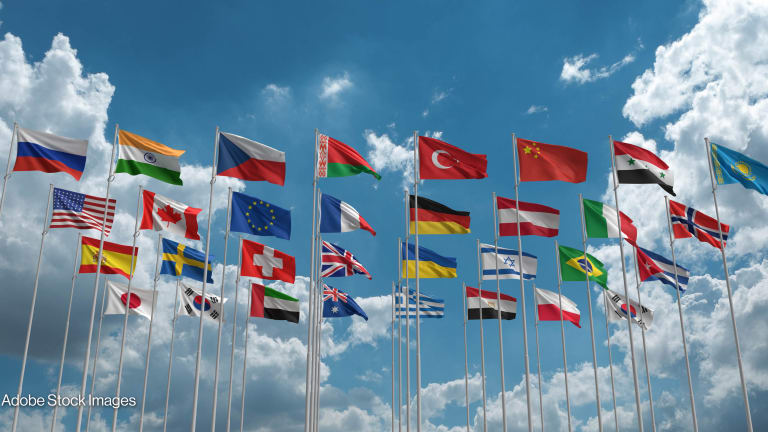
Earlier this spring, the World Bank released a salient tome, “World Development Report 2021: Data for Better Lives,” which has received little media attention. It claims that despite data’s unprecedented growth and ubiquity in recent years, it remains the under-fueled engine of development.
The report makes several calls to action to create an ecosystem where the value of data can be fully realized. This includes increasing capacity for data sharing and reuse, ensuring more equitable access to the benefits of data, and implementing safeguards to protect against misuse.
As a longtime data-for-development advocate, I can tell you that an ecosystem in which the benefits of data are fully realized and accessible to all is well within reach. The nonprofit organization I co-founded has, for years, been working with governments, NGOs, and other development actors to unlock the true power of data for sustainable change — more inclusive service delivery, better program and policy decisions, and greater participation and accountability.
What we urgently need now is committed leadership and a strong coalition of other development actors to lead the charge.
Data-for-development advocates must work tirelessly to convince governments, nonprofits, and NGOs that a sustained effort to increase data capacity will produce far more transformative results.
—Let’s examine one of the report’s calls to action: increasing data sharing and reuse capacity.
In 2002, Google and other tech giants began building infrastructures that allowed them to turn “data exhaust” into digital goldmines. While some of the resulting applications merit ethical scrutiny, the value these companies unlocked from data they once viewed as a mere byproduct cannot be ignored.
The development sector could theoretically open up similar value and do so responsibly. But in the current ecosystem, that value is being squandered. Too often, after a project ends, data gets locked in silos or vanishes entirely.
In 2016, for instance, I was part of an effort in Benin that launched a national open data portal to support the real-time monitoring of water services. Unfortunately, by 2020, securing the $5,800 per year required for its maintenance proved impossible, and so all that precious data just disappeared.
Now let me paint a different picture.
Imagine a region in which every community has citizens trained to collect data using their smartphones and that any organization — be it private, nonprofit, NGO, etc. — that wishes can mobilize and pay these local collectors through a dedicated platform.
The data gathered by the local collectors is then used to enable or enhance products and services that the organization offers to the community, including humanitarian assistance. Moreover, the data is owned by the community, securely stored and available for responsible reuse by other entities that may find useful new applications to it.
For example, a local business could use water data produced as part of a well installation project to plan maintenance services. Such data ecosystems have the potential to create business opportunities and boost employment in any region.
The scenario I have described is currently being piloted in Mali, and represents early steps toward precisely the kind of ecosystem we must cultivate if we wish to unlock the true power of data for development — an ecosystem in which valuable data is shared and reused, everybody involved benefits from the use of this data, and the data is owned by the community it’s harvested from.
The question is, how do we foster such an ecosystem at scale?
For starters, we need committed leadership. Creative sharing and reuse of data spurs innovation and unlocks value, but it also introduces risks of inequity and misuse, which must be mitigated through thoughtful social contracts as well as technical and legal safeguards.
These are points covered extensively in the World Bank’s report, so I won’t delve into them here, except to say that mobilizing development actors to create this ecosystem is a time-sensitive mission.
Big Tech companies are increasingly entering the development sector. While their participation could be promising, large private players tend to enter on their own terms and with stockholders on top of their minds. The goals they set, at best, only partly aligned with the public interest.
With a coalition of responsible development actors taking the lead, however, we can establish a data-sharing and reuse ecosystem that is designed to serve local communities first, particularly the 700 million people living in poverty who are still waiting to reap the full benefits of the data revolution.
In addition to ensuring community interests are advanced and protected, we also need committed leadership to help change prevailing mindsets.
Smart data management key to successful vaccine rollouts
Some countries are struggling to roll out the COVID-19 vaccines they have, whereas Rwanda rapidly administered the doses it received. Much of this was due to smart data management.
At present, data in the development sector tends to be viewed more as an administrative chore than an engine for profound transformation. There are many reasons for this point of view. Government turnover, for instance, makes implementing long-term solutions difficult since every administration brings a new set of priorities and diverts resources accordingly.
Moreover, data increases transparency, so if there’s potential, the insights will reveal poor performance or corruption, good data practices may be regarded with suspicion or even hostility.
Under such conditions, short-term projects that yield sound bite-sized metrics of success win out over more sustainable, more impactful initiatives. Data-for-development advocates must work tirelessly to convince governments, nonprofits, and NGOs that a sustained effort to increase data capacity will produce far more transformative results.
Most of us are already benefiting from the transformative power of an advanced data ecosystem. It’s time we unlocked that power for everyone.








